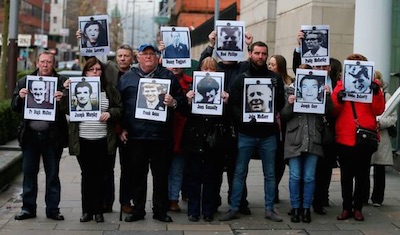
A major court examination of delays in coroners’ investigations of 95 legacy killings in the North, many of which date back more than 40 years, in currently underway.
Only three inquests have been heard since 2012. An intensive two-week long schedule of individual hearings is currently taking place to establish why the others have been stalled.
Bereaved families gathered at Laganside Courts in Belfast to accuse the PSNI police of deliberately obstructing inquests into murders in order to protect the force and the British Army.
Justice Weir is presiding over the hearings into 59 cases which include allegations of collusion with loyalists as well as direct state killings.
The time taken by the PSNI to disclose ‘classified’ files was repeatedly highlighted as the main obstacle in the way of progress. The force has argued it can take years for them to redact documents before they can be released to inquests, such as the kiling of two INLA Volunteers, Seamus Grew and Roddy Carroll, in 1982.
A PSNI representative told the court it could be two or three years before documents are made available to lawyers representing the Grew and Carroll families.
Barry McDonald QC, for the families, accused the police of failing to honour a series of similar disclosure commitments since the shoot-to-kill cases were re-opened in 2007.
“Obviously there is the suspicion within the families that the PSNI have been dragging their heels over disclosure in order to protect the RUC,” he said.
“They are fighting a rear guard action on behalf of the RUC, which they have done successfully to date. The sad fact is the PSNI cannot be trusted to honour their commitments.”
He added: “When there’s light at end of the tunnel for the families, the PSNI extend the tunnel.”
In regard to the inquest into the 1971 Ballymurphy massacre, the judge was told only one soldier involved in the three days of killings had been traced. It emerged there had been no substantive progress on disclosure, 13 months after a new probe was ordered by the Attorney General.
Outside court, John Teggart -- whose father Danny was one of eleven nationalists killed in Ballymurphy -- said proper resources had to be directed at resolving legacy cases.
“What you are talking about today, and the next couple of weeks, is 95 families sitting in the house with an empty space at the table,” he said. “This isn’t just figures - these are families, these are real people here. We need to remember that.”
Justice Weir also ordered the PSNI to immediately hand over case files required for the inquest of murdered GAA official Sean Brown. He issued the ultimatum after it emerged that disclosure of the documents on Sean Brown’s killing has been delayed again - this time due to “inconsistencies” in removing certain names.
A review hearing of the stalled inquest was told that names blanked out in one document were not redacted in others.
Mr Brown was abducted and shot after locking up a GAA club in Bellaghy, County Derry, in May 1997. Locals believe it was carried out by loyalist paramilitaries in collusion with the RUC.
Issuing a two-week deadline for the handover of 34 files deemed non-sensitive, the judge made clear that he would not tolerate further delay.
“This isn’t a place where people come in and do things at their own speed,” he said. “They do them when I say they are to be done.”
Karen Quinlivan QC, representing Mr Brown’s family, said the disclosure issues in the case were symptomatic of the problems besetting many of the outstanding legacy inquests.
She said the PSNI ignored previous deadlines for disclosure issued by now retired senior coroner John Leckey.
“This is one of the features (of the legacy cases) - the PSNI make commitments which they do not fulfil, routinely,” she said.
Mr Brown’s son Damian was among other family members watching from the public gallery. The family’s lawyer, Niall Murphy, of KRW Law, said the handover order represented a “massive step forward”.
“That we stand here, so many years on, not having received a scintilla, a single page, of evidence from the police, to now be told that the police are ordered to comply with a High Court judicial direction is very welcome indeed,” he said.
![[Irish Republican News]](https://republican-news.org/graphics/title_gifs/rn.gif)
![[Irish Republican News]](https://republican-news.org/graphics/title_gifs/harp.gif)

